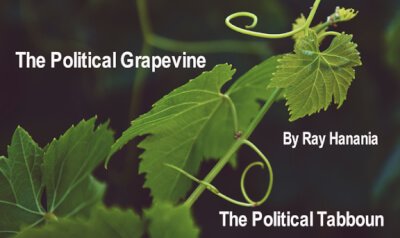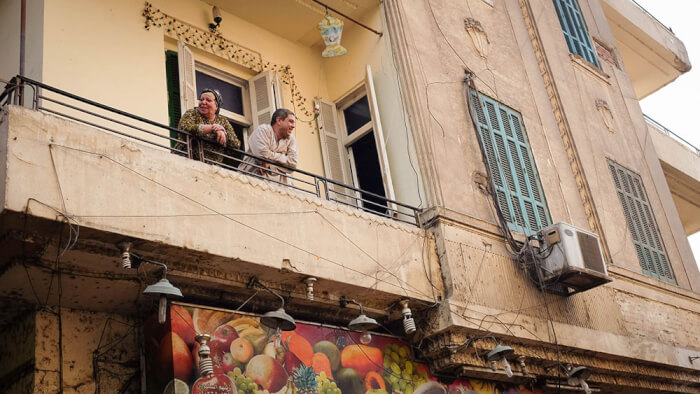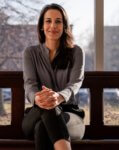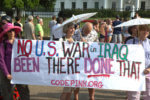The Tabboun: A collection of news briefs, stories and alerts. Chicago remains strong Palestine voice … More than 50 million children face refugee challenges worldwide with largest concern in Syria …
More than 50 million children face suffering with 45 percent tied to the endless violence in Syria
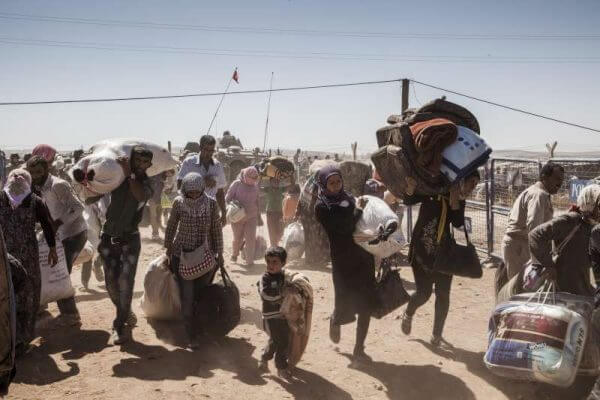
Across the globe, nearly 50 million children have been uprooted – 28 million of them driven from their homes by conflicts not of their making, and millions more migrating in the hope of finding a better, safer life. Often traumatized by the conflicts and violence they are fleeing, they face further dangers along the way, including the risk of drowning on sea crossings, malnourishment and dehydration, trafficking, kidnapping, rape and even murder. In countries they travel through and at their destinations, they often face xenophobia and discrimination.
A new report released today by UNICEF, Uprooted: The growing crisis for refugee and migrant children, presents new data that paint a sobering picture of the lives and situations of millions of children and families affected by violent conflict and other crises that make it seem safer to risk everything on a perilous journey than remain at home.
“These children are caught in circumstances beyond their control and are enduring so much needless suffering. It’s devastating to their future potential,” said David Morley, UNICEF Canada President and CEO. “For the millions of children already living as migrants and refugees, and for the millions more that could follow in their footsteps, we must take action now.”
Half of all refugees worldwide are children
Uprooted shows that:
- Children represent a disproportionate and growing proportion of those who have sought refuge outside their countries of birth: they make up about a third of the global population but about half of all refugees. In 2015, around 45 per cent of all child refugees under UNHCR’s protection came from Syria andAfghanistan.
- 28 million children have been driven from their homes by violence and conflict within and across borders, including 10 million child refugees; one million asylum-seekers whose refugee status has not yet been determined; and an estimated 17 million children displaced within their own countries – children in dire need of humanitarian assistance and access to critical services.
- More and more children are crossing borders on their own. In 2015, more than 100,000 unaccompanied minors applied for asylum in 78 countries – triple the number in 2014. Unaccompanied children are among those at the highest risk of exploitation and abuse, including by smugglers and traffickers.
- About 20 million other international child migrants have left their homes for a variety of reasons including extreme poverty or gang violence. Many are at particular risk of abuse and detention because they have no documentation, have uncertain legal status, and there is no systematic tracking and monitoring of their well-being – children falling through the cracks.
“Indelible images of individual children – Aylan Kurdi’s small body washed up on a beach after drowning at sea or Omran Daqneesh’s stunned and bloody face as he sat in an ambulance after his home was destroyed – have shocked the world,” said Anthony Lake, UNICEF Executive Director. “But each picture, each girl or boy, represents many millions of children in danger – and this demands that our compassion for the individual children we see be matched with action for all children.”
According to Uprooted, Turkey hosts the largest total number of recent refugees, and very likely the largest number of child refugees in the world. Relative to its population, Lebanon hosts the largest number of refugees by an overwhelming margin: Roughly one in five people in Lebanon is a refugee. By comparison, there is roughly one refugee for every 530 people in the United Kingdom; and one for every 1,200 in the United States. When considering refugee-host countries by income level, however, the Democratic Republic of the Congo, Ethiopiaand Pakistan host the highest concentration of refugees.
The report points to six specific actions that will protect and help displaced, refugee and migrant children:
- Protecting child refugees and migrants, particularly unaccompanied children, from exploitation and violence.
- Ending the detention of children seeking refugee status or migrating by introducing a range of practical alternatives.
- Keeping families together as the best way to protect children and give children legal status.
- Keeping all refugee and migrant children learning and giving them access to health and other quality services.
- Pressing for action on the underlying causes of large-scale movements of refugees and migrants.
- Promoting measures to combat xenophobia, discrimination and marginalization.
Refugee children missing out on education
The report argues that where there are safe and legal routes, migration can offer opportunities for both the children who migrate and the communities they join. An analysis of the impact of migration in high-income countries found that migrants contributed more in taxes and social payments than they received; filled both high- and low-skilled gaps in the labour market; and contributed to economic growth and innovation in hosting countries.
But, crucially, children who have left or are forcibly displaced from their homes often lose out on the potential benefits of migration, such as education – a major driving factor for many children and families who choose to migrate. A refugee child is five times more likely to be out of school than a non-refugee child. When they are able to attend school at all, it is the place migrant and refugee children are most likely to encounter discrimination – including unfair treatment and bullying.
Xenophobia leading to direct attacks
Outside the classroom, legal barriers prevent refugee and migrant children from receiving services on an equal basis with children who are native to a country. In the worst cases, xenophobia can escalate to direct attacks. InGermany alone, authorities tracked 850 attacks against refugee shelters in 2015.
“What price will we all pay if we fail to provide these young people with opportunities for education and a more normal childhood? How will they be able to contribute positively to their societies? If they can’t, not only will their futures be blighted, but their societies will be diminished as well,” Lake said.
Download a PDF of the report and multimedia content at: http://weshare.unicef.org/Package/2AMZIFQP5K8
About UNICEF
UNICEF has saved more children’s lives than any other humanitarian organization. We work tirelessly to help children and their families, doing whatever it takes to ensure children survive. We provide children with healthcare and immunization, clean water, nutrition and food security, education, emergency relief and more.
UNICEF is supported entirely by voluntary donations and helps children regardless of race, religion or politics. As part of the UN, we are active in over 190 countries – more than any other organization. Our determination and our reach are unparalleled. Because nowhere is too far to go to help a child survive. For more information about UNICEF, please visit www.unicef.ca. For updates, follow us on Twitter and Facebook or visit unicef.ca.
SOURCE UNICEF Canada
Image with caption: “A young girl holds a railing outside her family’s partially destroyed home in Gaza City. She is among 60 children and 20 adults from the same family living in the house, which was hit during an air strike a year ago. The rubble and debris from the dwelling – visible behind her – serves as the children’s playground. © UNICEF/UNI188295/El Baba (CNW Group/UNICEF Canada)”.
Chicago remains strongest voice for Palestinian freedom, according to anti-Arab activists report. Pro-Israel group releases report on efforts to silence supporters of Palestinian rights and to expose human rights violations of Israeli government on American college campuses.
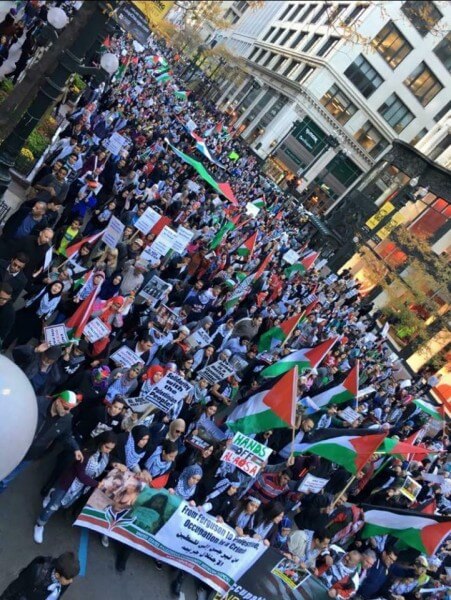
The report notes that pro-Israel activism on college campuses has increases 151 percent while pro-Palestinian activism has been reduced significantly … except in two locations, Chicago and the West Coast. Here is the press release from the Israel on Campus Coalition (ICC):
Israel on Campus Coalition (ICC) today (Sept. 6, 2016) released its annual report on Israel-related trends at American colleges and universities. ICC collects and analyzes reports from its national partner organizations, local campuses, and open-source material to identify and assess changes in Israel-related activity at individual campuses and across the broader campus community.
The report found that the 2015-2016 academic year marked a turning point for the pro- and anti-Israel campus communities. ICC observed an overall decline in the number of anti-Israel Boycott, Divestment, and Sanctions (BDS) campaigns on U.S. college campuses. Instead, anti-Israel activists refocused their efforts on other activities, such as attention-getting, visceral displays of anti-Israel sentiment, heckling, and disruptions of Israel-related events that attempted to intimidate and silence lecturers and guest speakers.
ICC also observed an increase in overall pro-Israel activity on U.S. campuses with visible support for Israel, namely pro-Israel rallies and demonstrations increasing by more than 151 percent, coinciding with a 36 percent increase in cultural programming.
“Last year, college campuses saw notable shifts in both pro- and anti-Israel activity. While rates of BDS may have fallen, this by no means suggests those who seek the destruction of Israel are slowing down,” said ICC Executive Director Jacob Baime. “As anti-Israel activists test the limits of what passes for acceptable anti-Israel action on campus, the pro-Israel community must continue working to support student activists who engage with their peers, pursue dialogue and understanding, and work toward peace.”
In addition to these trends, ICC observed important changes within the anti-Israel movement. As anti-Israel activity declined on the West Coast, there was a surge of anti-Israel activity in Chicago. In ICC’s 2014-2015 Campus Trends Report, ICC noted an increase in anti-Israel activity on the West Coast and in the Midwest. During the 2015-2016 academic year, anti-Israel activity decreased on the West Coast and continued to increase in the Midwest.
For the full 2015-2016 Campus Trends Report, click here.
South Africa hosted a media conference on Israel-Palestine peace
The South African Government in partnership with the United Nations Department of Public Information and with the support of the Embassy of Sweden in Pretoria, will co-host the United Nations International Media Seminar on Peace in the Middle East. The purpose of the seminar is to sensitise public opinion, prevailing media coverage on the peace processes and to enhance dialogue between the Israelis and Palestinians.
The discussions will focus on a variety of issues, including the prospects for a political solution of the Israel-Palestine conflict; the deteriorating humanitarian situation in the occupied Palestinian territory; the Israel-Palestine story expressed through documentaries and films; political satire as a peacemaker; virtual reality as the next frontier in storytelling; and the power of animation to communicate complex issues about the situation.
Members of the media are invited as follows:
Date: Wednesday, 31 August 2016 – 2 September 2016
Venue: Conference room 2, O R Tambo Building, 460 Soutpansberg Road, Pretoria
AHRC Detroit commemorates International Literacy Day
American Human Rights Council
The American Human Rights Council (AHRC-USA) joins the United Nations Educational, Scientific, and Cultural Organization (UNESCO) and communities across the globe in honor of International Literacy Day on September 8, 2016. This year marks the 50th Anniversary of International Literacy Day, and UNESCO is honoring this important time with the theme “Reading the Past, Writing the Future.”
International Literacy Day began five decades ago to provide a platform for the United Nations, governments and civil society to join to together to increase literacy rates worldwide. As we continue to move forward, International Literacy Day also serves as a day to recognize and address the continuing challenges global communities face to increase the literacy rates of their citizens.
“Literacy and education are important components to the well-being and quality of life for every person in the world,” said Imad Hamad, AHRC Executive Director. “Literacy and education helps to lift people out of poverty, advocate for their human rights, and become strong advocates for their families, their communities and our common humanity,” Mr. Hamad continued.
AHRC-USA encourages all to participate in the celebration of the 50th Anniversary of International Literacy Day. Locally, AHRC encourages everyone to volunteer with various literacy organizations and initiatives to increase literacy rates here at home.
To learn more about International Literacy Day, please visit www.unesco.org. For information on the AHRC, visit their website at www.ahrcusa.org.
Arab Daily News adds Kerning Cultures to its writing roster
The Arab Daily News, one of the most read online news sources on American Arab and Middle East issues, is proud to announce that it has added the popular Middle East podcast group, Kerning Cultures, to its lineup of contributors of journalists, bloggers and opinion writers.
Kerning Cultures defines itself as a broad-based, diverse group of voices on Middle East issues, writing:
The current public narrative of the Middle East is riddled with politically charged misconceptions. We live in a world far more complicated than standard dualisms of West/East or modern/traditional, and yet, foreigners and locals, alike, form quick and often negative interpretations of the culture, traditions, and day-to-day.
Kerning Cultures is a podcast of entrepreneurship, philosophy, culture, history, arts, and technology stories from the Middle East for a more complete narrative of the region.
Here is their latest podcast:
For more information on Kerning Cultures, visit them online at kerningcultures.com.
Israel-Palestine take back seat in Clinton-Trump war
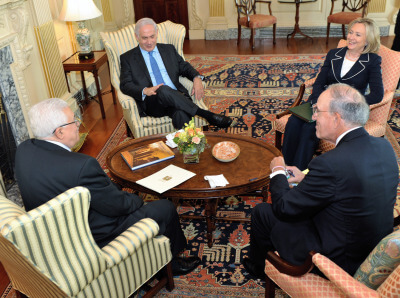
Despite some controversial and questionable news blurbs, very little is being said about Israel and Palestine in the contentious and personal war between former Secretary of State Hillary Clinton and billionaire businessman Donald Trump. Clinton is the Democratic nominee for President and Tump is the Republican nominee for President.
It is quite a contrast to the battle four years earlier between President Barack Obama, who was seeking re-election in 2012, and his Republican challenger, the lame Mitt Romney. Romney was trounced in the election and has since been marginalized as insignificant in American politics.
But in the 2012 contest, Romney received a strong boost from Israel’s rightwing Prime Minister Benjamin Netanyahu, who was attacking Obama over many issues including the Israel effort to sabotage the American-led campaign to force Iran to give up its plans for nuclear weapons. Obama got Iran to sign a deal over nuclear energy and Netanyahu was angry he couldn’t send war planes to destroy the Iranian facilities and kill more Iranian civilians.
Demonstrating his extremist anger, Netanyahu invited Romney to Israel where he was showcased and feted by Israel’s growing rightwing and hardline groups and activists including casino and gambling billionaire with passports and allegiance to both Israel and the United States, Sheldon Adelson.
Netanyahu attacked Obama repeatedly and did his best to influence the election in hoping to defeat America’s first African American president, but failed miserably.
This time, Netanyahu is staying out of the fray.
Mediterranean Diet continues to lead healthy living

Forbes Magazine did a phenomenal article detailing the benefits of the Mediterranean Diet.
“The rock star of all diets, the Mediterranean diet has been linked to a lower risk of everything from diabetes to dementia. It’s famously good for the heart–people who stick to a Mediterranean diet over the years have markedly lower risk of heart disease than non-partakers. But a new study now also shows that for people who already have heart disease, eating a Mediterranean diet lowers the risk of mortality in the years to come. And, as some have suggested, the benefit that comes from the diet may be even greater than that from one of the most common heart treatments–statins.”
Click here to read the story …
The Mediterranean Diet is believed to help people with heart related issues to improve and to improve the health of people in general. One component of the diet is the use of Extra Virgin Olive Oil in the diet, and also Hummus which contains garbanzo beans (legumes) which are among the most important food items for good health.
A great place to get recipes and information on the Mediterranean Diet is at this Facebook Page:
https://www.facebook.com/groups/113491742021800/


- Israelisnipers shooting and killing hospital workers in Gaza - December 11, 2023
- CAIR Condemns Israeli Executions of Wounded, Unarmed Palestinian in West Bank - December 11, 2023
- Arab and Muslim American voters face a “simple choice” between Biden’s inhumanity and Trump’s edgy politics - December 9, 2023













